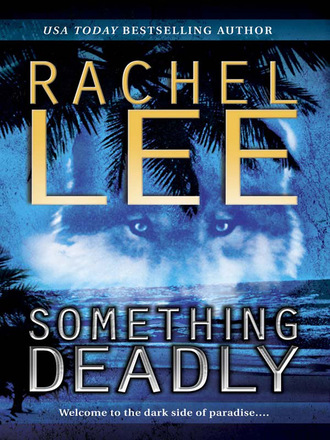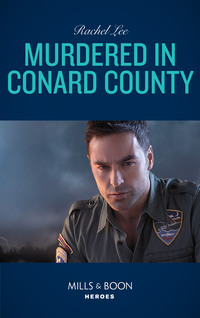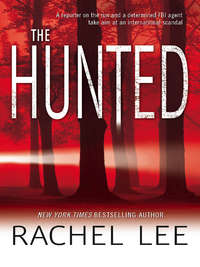
Полная версия
Something Deadly
“I’m not sure what we have. When I saw the body last night, it felt squishy everywhere.”
Hal shrugged. “Congestive heart failure.” In congestive heart failure, the body could retain thirty or forty pounds of excess water.
“Ankles weren’t swollen.”
Finally Hal frowned, getting the message. “What are you trying to tell me?”
“I don’t exactly know, Hal. It could be edema, but if it is, it’s the worst I’ve ever heard of. It was more than a spongy feeling.”
“Lovely. Who was it?”
“Carter Shippey.”
“Oh, Jesus.”
Declan nodded. “I gave him a physical a month ago. He was fine.”
He put his feet up on the desk and sipped his coffee, pretending that he hadn’t been anxious since last night. Coming to the island had been his attempt to unwind, to leave behind the tension that had been nigh on to killing him. Unfortunately, the nightmares hadn’t been left behind, and unpleasant events reminded him that his natural tendency was to stay wound up tighter than a drum.
It didn’t help that Carter Shippey hadn’t looked like any sudden-death heart attack victim he’d ever seen.
Hal was still shaking his head in disbelief.
“Of course,” Declan continued, “a fatal arrhythmia could strike without warning. That’s why it’s called sudden death. But the way Cart looked, the way his body felt when I knelt to examine him last night…”
The dead were always flaccid until rigor began to set in, but Carter Shippey had been more than flaccid. He’d almost felt like…dough. As if there had been nothing rigid beneath his skin at all. That degree of edema was extraordinary, and congestive heart failure didn’t usually come on so rapidly.
“He should have been having other symptoms,” Declan said, more to himself than Hal. “Shortness of breath, coughing, swelling of his extremities.”
“Yeah.” Hal took a deep swig of coffee. “Well, let’s go see if we can figure it out. No point waiting.”
The hell of being the M.E. on an island this size was that you were apt to know the person who had lived in the body you were cutting open. Declan still had a bit of difficulty with that. On rare occasions it even made him long for the anonymity of the big city E.R.
They suited up in scrubs, Tyvek surgical gowns, rubber gloves and, finally, plastic face shields. Declan pointed to the cooler door, and Hal opened it. Carter Shippey’s body, covered by a paper sheet, slid out on its tray.
A chill crept along Declan’s spine, and he found himself ardently praying that he was wrong, that he’d missed something at Carter’s physical, that the doughy feeling had indeed been edema from congestive heart failure. The thought surprised him, for he would feel awful if he’d missed the diagnosis on an easily treatable condition and cost Carter Shippey his life. But the alternative frightened him more.
He pulled the sheet back and gasped.
Carter’s body was still fully clothed, and that was all that made him identifiable as a human being. He looked like an inflatable mannequin that had sprung a leak. Last night he’d been flaccid. This morning he was flat, as if his body were nothing but a puddle within his skin.
“Jesus Christ,” Hal said.
“Make that a prayer,” Declan said. “For me, too.” Even though he didn’t believe. He hadn’t believed in God for years now.
Their eyes met across the body.
“Don’t touch him,” Declan said. “Get out of here now, and strip your suit this side of the door.”
Hal didn’t hesitate to obey. Declan felt an equally powerful urge to get out, but he stood a moment longer, looking down at his friend’s remains, astonished that someone he knew could become unrecognizable so fast. With a rubber covered finger, he pressed Carter Shippey’s side and felt his finger sink in as if into jelly, meeting no resistance at all.
Then he took his own advice. He left the body on the table. The less it was handled the better. Outer-wear and gloves went into the biohazard chute, and he hurried into the office where Hal was awaiting him, trying to steady his cup of coffee in an unsteady hand.
Speaking the words out loud wasn’t easy. Even to Declan they sounded a little nuts. But his instincts, honed by years of experience and training, and an innate honesty that sometimes got him into trouble, wouldn’t allow him to dissemble about something like this.
“It’s got to be infection. I’m reluctant to say a hemorrhagic fever…there was no hemorrhaging from the body orifices, nor apparent ulceration of the skin. But…” Declan looked past him, reconsidering all the unhappy thoughts that had been troubling him since last night. “Ebola and Marburg don’t kill that fast, anyway. And I don’t know of anything that dissolves bone.”
“Bone?” Hal looked sickened and reluctant to believe it, though he had just seen it. “Can I resign now?”
Declan met his gaze directly. “Sure. You didn’t sign on for Biohazard Level Four.”
Hal took a slow, deep breath. His gaze lifted slowly. “Neither did you.”
Declan nodded. “We follow the strictest sterile procedures. I’m calling the local Haz-Mat guys to deliver us a couple of their decon suits and masks.”
Hal sat and settled back in his chair. “Good. Time to finish my coffee.” The milky liquid sloshed as his hand shook.
Declan made the call, then stared through the glass window between him and the body on the tray and hoped to hell that whatever killed Carter Shippey wasn’t airborne. Because if it was, a whole lot of people were in trouble.
Chet Metz, of the island’s fire department, showed up twenty minutes later with two gray-blue decontamination suits. Santz Martina’s Haz-Mat team had never been called out before, as far as Declan knew. The island had the usual small-town collection of hazardous materials: dry cleaning fluids, petroleum products, fertilizers, insecticides. The fire department maintained a team for the sake of preparedness.
“So what’s going on?” Chet wanted to know as he helped Hal and Declan into the suits. He was a beefy man in his early thirties, with steady gray eyes and a thick head of hair.
“I just don’t want to take any chances,” Declan said.
“Chances, huh?” Chet looked him straight in the eye. “Must be a big chance.”
“Don’t say anything.”
“You know I won’t, Dec. Okay, let’s tape you in.”
Chet wound yellow duct tape around their ankles and wrists, making airtight seals for their rubber boots and gloves.
As they hefted their masks, Chet said, “You know, there’s no way to decontaminate you here after you’re done. Not if it’s a biological hazard.”
“There’s a shower in there,” Declan said. “And plenty of bleach. We’ll wash down.”
“If you think that’s enough. I’ll wait.”
Declan nodded at him. “Thanks, Chet.”
Biohazards were part of hospital life and of autopsies in particular. Ordinary care was usually enough: rubber gloves, a face shield to protect the eyes, nose and mouth from any kind of spray from the victim, Tyvek gowns over scrubs. But Declan wasn’t going to be happy with ordinary precautions this morning. He was very, very nervous about what was inside the body.
Once the masks were in place, he and Hal were breathing the purest air in the world. The micron filters would capture even the smallest virus.
“That’s as good as we can do,” Chet said. “I hope to God it’s not airborne.”
“If it is,” Dec said, “we’re all already dead.”
“Oh, cripes, thanks,” Hal muttered.
If Carter Shippey had died from an airborne infection, the chances were high that dozens of other people had already been infected. Carter, after all, was active in the Rotary and his church, and volunteered in the high school shop classes.
Declan and Hal walked into the autopsy room and faced one another across the body. Metz was watching from the other side of the glass, and when Declan glanced up briefly, their eyes met.
Hal picked up the camera he brought to every autopsy and began shooting from every angle, even climbing on a ladder to shoot from above. No step of this process would be overlooked.
The first task, after initial photos, was to remove the victim’s clothes intact. The job proved nearly impossible with a body that sagged formlessly. They managed it, though, and after examining each piece of Carter’s clothing, they put all the pieces into red biohazard bags.
“Nothing,” Declan remarked. Nothing other than the usual loss of bodily control at death. No blood. Not a smidgen anywhere. Nor did an examination of the body itself, now little more than a fluid-filled sack, reveal any sign of wound or blood.
“Well,” Declan said, “it’s not Ebola or Marburg. Or any other known hemorrhagic fever.”
“Thank God for small mercies,” Hal muttered.
“I’m not sure that’s a mercy,” Declan said. “Those take time to kill you, and with proper treatment a lot of people can survive. This was fast. His wife said he was okay when she left for her bridge club and dead when she came home.”
“And it’s still working,” Hal said. “He didn’t look like this last night, did he?”
“Hell no.” Declan picked up a scalpel. He wouldn’t need a bone saw. Nor did he want to make a large incision into this body until he knew what might come out.
His hand paused over what had once been a man’s abdomen. He looked toward the glass.
“Chet? This island has to be quarantined immediately.”
Chet didn’t answer for several seconds. His gaze was fixed on the body on the tray as if he couldn’t believe his eyes.
“Uh…can I do that? I don’t have authority.”
“I do,” Declan said. “It’s under my emergency powers. Call the Emergency Management Office and tell them. I want this island shut down. No one in, no one out, until we find out what the hell did this.”
Chet nodded.
“Then get back here,” Declan said. “Because after I open up this body and take some samples, and Hal and I hose each other off, I’m sure as hell going to need help getting out of this monkey suit.”
“Right.”
Looking green, Chet turned and disappeared.
Hal didn’t look too much better. “Do we have to open him?” he asked. “It’s obvious something’s eating his insides. I mean…what if it explodes all over us?”
“We’re covered,” Dec said, refusing to admit that he had any qualms. “Look, Hal, we’ve got to do it. We’ve got to find out what did this before somebody else dies.”
Hal nodded. He drew an audible breath. “Okay. I’m documenting.”
Declan made the first cut with his scalpel.
Carter Shippey hadn’t rotted. He had liquefied inside his own skin. There were no identifiable organs left to remove, and what remained of the bone had become rubbery, almost like cooked cartilage. Declan saved as many samples as he thought would be useful, telling Hal to freeze them all.
Carter Shippey’s brain and spinal cord were the only parts still intact, though they showed violent hemorrhaging. More samples were frozen.
Declan sewed up his incisions as quickly as possible and put the body back in the cooler. He didn’t allow himself to think much about what he’d just seen, beyond the clinical notes he’d dictated to Hal. Interpretation would come later. Right now, he was simply collecting evidence.
Inside, deep inside, some quiver of unease refused to be silent, though. It wouldn’t let him completely ignore what faced him. What might face the entire island.
Dec and Hal scrubbed the entire autopsy room, then poured bleach over each other and took turns under the overhead high pressure shower. When they were done with the shower, they hosed each other and the entire room. The water and the contaminants flowed down a drain into a deep septic tank where hazardous waste was chemically treated and could decompose safely.
Out in the antechamber, Chet helped strip them out of the suits. For the first time, Declan realized that sweat had plastered his clothes and hair to him.
“What did they say?” he asked Chet, when at last he could sag into his chair. His legs felt weak, as if he’d just run ten miles. His hands were shaking, an old and familiar reaction.
“Well,” Chet said, “they weren’t happy about it. But I told them if they’d seen what I saw, they wouldn’t hesitate. So the order’s going out. The flak should begin any minute.”
“Yeah.” Flak. For some reason he thought of Jaws and the mayor who didn’t want to close the beach. “I need to call the Centers for Disease Control. This is way beyond my expertise.”
“You know,” Chet said, “this is going to freak out the whole damn island.”
“I’m sorry about that,” Declan said, “but we can’t be irresponsible. Anybody who’s worried is better off staying at home anyway.”
Hal’s dark eyes reflected doom and gloom. “Remember what they tried to do to that town in Outbreak?”
“Oh, jeez,” Chet said. “Let’s not even go there, okay?”
“Right,” Declan agreed. “We don’t know what we have here. It might not be infectious at all.”
But he could feel they were sitting on a time bomb.
Ken Wilson died today. No one knows why, or if they do, they’re not saying. I asked the medic about it. I’ve heard all kinds of stories about Caribbean bugs. Wouldn’t that be my luck. Get drafted, avoid the Nam, and end up on an infected island.
I should’ve left those bones alone. Bad luck to mess with bones.
3
At her clinic, Markie Cross repaired a dachshund’s torn ear, quilting the two pieces of cartilage back together. It would never look quite right again, but it was better than leaving the cartilage separated. So much damage from another puppy’s bite.
She twisted her head, easing the tension in her shoulders. Mornings were for surgery. She’d already done one neuter, one spay, a tumor removal and extracted an infected tooth. If all went well, the ear should be the last surgery of her day. Then she could move on to the office visits, which she generally enjoyed, because they allowed her to interact with both patients and owners.
A movement to the right caught her eye, and she glanced over to see Kato standing on his hind legs, looking through the window that separated the surgery suite from the rest of the clinic. He was looking more somber than usual this morning.
Not that she blamed him. Last night hadn’t exactly been pleasant, and it must have been worse for him. She had no doubt his nose had given him a far better picture of what had happened to Carter Shippey than the words had given her.
He had seemed to like Declan Quinn, though, which was a rarity for him. Kato’s usual habit was to stand several yards away and watch new people until he’d made up his mind about them, a process that might take multiple encounters. Last night, though, it was as if Kato had known Declan was there to help someone.
She shrugged away the thoughts of last night and focused on her work. One more stitch, then done. The dachshund was already starting to wake from anesthesia.
Markie’s first routine client of the morning was one of her favorites, Dawn Roth. Dawn had more money than one person could possibly spend in a lifetime, but she remained amazingly unspoiled. Apart from volunteering in every conceivable way, she raised English mastiffs.
To Markie’s way of thinking, anyone who could handle two hundred pounds of slobbering dog was special. Someone who loved them enough to breed them, and love each of them as her own child, was a rare gift. To adopt one of Dawn’s mastiffs required a background check that would have put the FBI to shame.
Today her patient was Brindle Castlereagh, a champion female who was into late pregnancy. Brinnie, as Dawn called her, had gone into heat out of season. The result was going to be a litter that couldn’t be registered, because the sire couldn’t be identified. That didn’t faze Dawn; she was caring for this litter as carefully as all the rest.
“Isn’t it horrible about Carter Shippey?” Dawn asked as Markie palpated Brinnie’s belly, identifying two healthy and vigorous pups.
“Soon now,” she told Dawn. “Any day, in fact.”
“I thought so.”
“And yes, it’s terrible about Mr. Shippey.”
“He was only sixty-three.”
Markie nodded. “He wasn’t all that old.”
“No. To tell you the truth,” Dawn said, her voice dropping, “it put me into a tailspin about Tim. He works so hard at his fishing business, and lately he’s not even having time to play tennis or golf….”
Markie patted Brinnie’s shoulder, then turned toward Dawn. “Tim’s a lot younger and very healthy. You know that.”
“So was Carter, I thought.” Dawn shook her head. “Not that I really knew him all that well. I understand he was quite the character in his younger years, when he owned the boat.”
“So I’m told,” Markie said. She had only known Carter Shippey as a somewhat grizzled old sailor who loved his dog more than life itself. He’d sold the boat and retired just after she’d come to Santz Martina. “I didn’t know him well, either.”
“But I know his wife, Marilyn, from my work at the school. She teaches English, you know. A wonderful woman. She and Carter had such plans….” Dawn’s voice trailed off. “Well.” She visibly gathered herself.
Markie straightened and sat in the chair next to Dawn’s. Brinnie, sensing Dawn’s discomfort, gave her owner a sloppy kiss. Dawn managed a chuckle.
“I’m worrying for no reason,” she said. “Sometimes people die young. But most don’t, right?”
“Right,” Markie said. “But when it’s someone near our own age, it makes us really uneasy.”
“Yeah. I think I’ll go home and make Tim a key lime pie. He loves my pies. When we first got married, he was always so tickled when I’d bake one. I haven’t done that for him in years now.”
“That sounds like a wonderful idea.”
“Yeah, it does.” Dawn was suddenly smiling again. “I’ll call you when Brinnie decides to whelp, then.”
“Yes, do. I want to be there.” Mastiffs sometimes had trouble giving birth, and none of Dawn’s ever whelped without a vet present. Markie loved the opportunity to be there; most dog owners didn’t bother, and nearly everyone on the island had their pets neutered anyway. Seeing puppies born was becoming something of a treat for her.
After Dawn left, Markie noticed that Kato had vanished from the back rooms of the clinic, no doubt gone to his cool retreat in the farthest reaches of the kennel. The reason was soon evident, as Markie discovered that her next three patients were cats.
Kato took after his husky forebears in his dislike for cats. At least he merely disdained them and didn’t look upon them as part of the food chain, as many huskies did. The cats, of course, weren’t insulted. They disdained him as the lower order creature he clearly was.
Once the cats were gone, and the iguana and the rabbit arrived, Kato reappeared, licking the rabbit comfortingly and regarding the iguana with sympathy as Markie cleaned and patched a festering wound in its side.
The day passed as so many others before it had, with only two differences: Declan Quinn popped into her mind dozens of times, and by the end of the day she was wishing she had invited him in for coffee last night. And she couldn’t shake the memory of Kato’s low, mournful howl.
“I am not going to quarantine this island,” Stan Freshik told Declan on the phone. He was the chief of the emergency management team, a good man who was used to dealing with hurricanes, not diseases. He had plenty of excellent evacuation plans, but no quarantine options. Such an eventuality had never been considered. “Do you have any idea what kind of panic that will cause?”
“It’s going to cause a panic anyway,” Declan told him flatly. “I can’t keep this a secret. That would be criminal. And CDC is already sending a biohazard response team. If you won’t shut us down, they will.”
“Jesus, Dec. You don’t even know what this is. You can’t say for sure it’s contagious.”
“But I can’t say for sure that it isn’t. I can’t even tell you how long its incubation period is, if it is contagious. I wish I could. But my point is, there’s going to be panic whether you declare a quarantine or CDC does. My advice to you is to get some planning underway and take the first steps, because you might be able to minimize the public response if you start right away. Because once CDC gets here, the shit is going to hit the fan.”
Stan’s sigh was both irritated and impatient. “God damn it!”
“That’s not going to help anything,” Dec reminded him. He was looking through the window at the cooler where the body was once more stashed. “You know I have the authority. I’m the chief medical officer on this island. Consider this a heads-up. CDC will be here by five.”
“By five? My God, that’s not any time at all.”
“Exactly.” Dec glanced at the clock on the wall. “Seven hours. I suggest you shut down the airport first. If you don’t call the Coast Guard, I will.”
“If this isn’t contagious…”
“Then you can have my head on a platter. Stan…” Declan hesitated. Finally he said, “I’m scared, too. But we have to do the responsible thing.”
When he hung up, assured that Stan would do what was necessary, Declan continued to stare into the autopsy theater. Because he had already had two unprotected exposures to Shippey’s body, he had canceled all his appointments for the day, not wanting to risk infecting a patient.
It was sort of like sitting on death row, he thought sourly. Trapped here with that body, basically. He’d already sent Hal home, with strict orders to stay there. At least Hal didn’t have a family.
But there were others who’d already been exposed: Carter Shippey’s wife, certainly. The cops, the crime scene team and all of Carter’s friends and family.
He could, he supposed, judge himself to be no more contagious than anyone else. But he was. Decon suit notwithstanding, from the instant he had cut into the body, this entire morgue had become a death zone. An airborne virus couldn’t be contained by a mere door.
The morgue had its own air circulation system because of the highly contagious diseases that were sometimes autopsied here, so whatever it was shouldn’t spread beyond the morgue very fast, especially since a slightly lower atmospheric pressure was maintained in here. Nothing was too good or too expensive for the wealthy.
But this wasn’t a maximum security biocontainment facility. It was state of the art for the routine types of contagion that were expected, but it was not proof against the worst that Mother Nature could offer.
Declan had never had any desire to be on the cutting edge of research. Doctoring people had been his highest ambition. It gave him no pleasure at all to consider that he might have discovered a brand-new disease.
Happiness filled Kato when the day was over and he and Markie began their evening walk home. It wasn’t that he didn’t enjoy being at the clinic. Being so near to other animals, especially dogs, filled him with joy, even when they hurt and needed his attention. But today there had been too many cats.
He’d learned from Markie at a very early age that cats were off-limits. He couldn’t begin to understand why—they clearly smelled like prey—but it seemed that many humans actually liked the creatures. So, to please Markie, he simply departed the vicinity of any feline.
Which was not to say he didn’t occasionally pretend that his tug toy was a cat. But dreams were only dreams.
Traveling down the sidewalk at a brisk pace, he noted that some human had recently passed, leaving a trail of illness in the air. He tested it, drawing quick bursts of air into his nose and expelling them through his mouth. No, it was not the smell of last night.
As they passed one house, a small dark dog yapped annoyingly from behind a window. Oh-look-oh-look-another-dog-another-dog-oh-look-oh-look! Kato gave the dog a dismissive turn of the head. Such a waste of energy. He preferred to remain silent and watchful. One’s voice was meant to sing, and singing was reserved for special occasions: play or need or union. Otherwise, silence aided the senses in being watchful.












